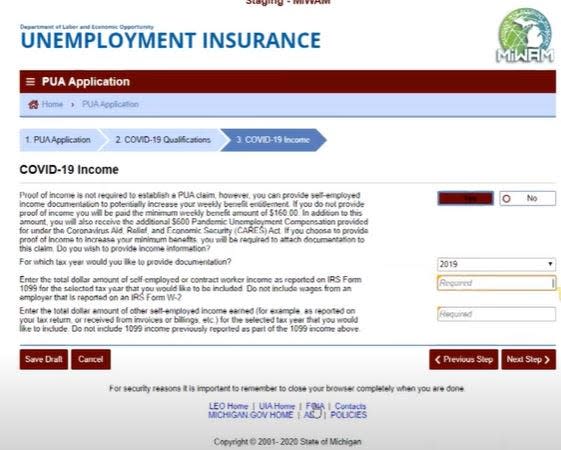Pandemic unemployment insurance claimants, told they misreported income, get waivers
Certain pandemic unemployment claimants who were told by Michigan's Unemployment Insurance Agency that they misreported their income and must return thousands of dollars have received waivers for their overpayment bills, the agency confirmed Tuesday.
The news comes five months after the Detroit Free Press highlighted that certain claimants who received Pandemic Unemployment Assistance benefits were accused of misreporting their income and were to repay the excess benefits they had received. Two days after the story was published, the state agency said those claimants would receive a waiver.
This is the third round of waivers issued this year for claimants who were told they had to repay the benefits they received in the pandemic. More than 14,000 waivers have been issued in this round, Nick Assendelft, a spokesperson for the agency, said. He said about $70 million was waived and $4.5 million will be refunded to claimants who had paid back the benefits.

"We are fixing the problems of the past, helping workers today and enacting long-term agency reforms for a future with better, faster service and zero tolerance for fraud,” Julia Dale, director of the state's Unemployment Insurance Agency, said in an emailed statement. "During the pandemic, the UIA worked tirelessly to get money out the door to help Michiganders in crisis pay their bills. Based on confusion created by shifting federal guidelines, UIA worked with our federal partners to bring relief to Michigan workers who received too many benefits through no fault of their own and now have received payback notices."
The U.S. Department of Labor issued guidance to states in February on how to address overpayments when the claimant is not at fault. It specifically said states could apply blanket waivers for overpayments for claimants who were approved for a higher weekly benefit amount than what they should have received.
The reason for the higher benefit amount is that these claimants entered their total pay, or gross, not net. Claimant screenshots and instructional videos posted by the agency show for a period of time, the agency asked for the total dollar amount of income, not net pay.
But the agency said in hearings with administrative law judges that claimants should have entered their net pay from prior years in order to determine their weekly benefit amount.
Assendelft said the waivers were provided after the agency initiated discussions with the U.S. Department of Labor for guidance on waiving the overpayments and refunding payments. Since the money paid to workers was federal dollars, the UIA needed the department's approval for the process, he said.
So far this year, the agency has issued 76,347 waivers. Before this group of claimants received waivers, the most recent round of waivers went out in July to 7,300 claims that workers received between March 15, 2020, and May 30, 2021, under a state jobless claim, extended benefits or Pandemic Emergency Unemployment Compensation (PEUC).
It's unknown exactly how many claimants are eligible for a waiver for an overpayment because of limitations of the agency's computer system, which make it difficult to access that information quickly, Assendelft has said previously.
Michigan will settle 2015 unemployment false fraud lawsuit for $20 million
Another class action lawsuit filed against Michigan's Unemployment Insurance Agency
Separately, a federally authorized pause in "new" collection activities for nearly 400,000 unemployment insurance claimants who were told they were overpaid benefits was set to expire Monday. It wasn't immediately known Tuesday evening if that pause expired or if the agency requested an extension or another pause.
Assendelft said claimants do not need to apply for a waiver and those who qualify were sent a message through their Michigan Web Account Manager (MiWAM) account. They will also receive a letter mailed to the address on file.
Those with questions about overpayment waivers can go to Michigan.gov/UIA and click on the "Schedule an Appointment" link to set up an in-person, phone or online meeting with an agency employee, he said.
Contact Adrienne Roberts: amroberts@freepress.com.
This article originally appeared on Detroit Free Press: Michigan unemployment claimants told they owed money back get waivers

